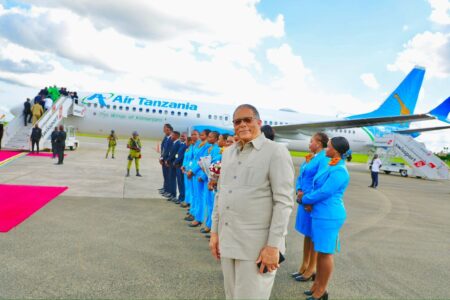The International Monetary Fund (IMF), the international economic advisory body, has cut its forecast for Tanzania’s economic growth for this year and 2020 to four percent, down from previous expectations.
Tanzania is forecast for economic growth of 4 percent in 2019 before accelerating modestly to 4.2 percent in 2020 – a drop from an estimated 6.6 percent in 2018. In January last year, the IMF said it expected Tanzania’s economy to grow between six and seven percent over the medium term, provided the country increased capital spending and improved its business environment. However, the organization has drastically cut its outlook for the country, predicting growth of four percent in 2019 and a minor increase for 2020.
The Fund also predicts Tanzania’s consumer price inflation will reach 3.5 percent this year and rise to 4.5 percent in 2020.
The IMF’s revised forecast contradicts government estimates that predict the economy will grow by 7.3 percent in 2019 off the back of an estimated 7.2 percent expansion last year.
In its World Economic Outlook (WEO), the IMF warned against compounding more debts, with emphasis on developing nations to avert derailing their sustainable goals.
“Growth for 2018 was revised down by 0.1 percentage point relative to the October 2018 World Economic Outlook, reflecting weakness in the second half of the year, and the forecasts for 2019 and 2020, are now marked down by 0.4 percentage point and 0.1 percentage point, respectively,” the Fund said in its revised new World Economic Outlook for 2019 released in Washington, at the on-going 2019 Spring IMF/ World Bank Meetings.
It explained that the revised growth projection followed a confluence of factors, which affected major economies, including China’s growth decline following a combination of needed regulatory tightening to rein in shadow banking and an increase in trade tensions with the United States. The Euro area economy also lost more momentum than expected as consumer and business confidence weakened.
For sub-Saharan Africa, the new revised outlook said: “The outlook is surrounded by significant downside risks, particularly considering the elevated policy uncertainty in the global economy.
Shielding the recovery and raising medium-term growth would require reducing debt vulnerabilities and creating fiscal space through more progress on domestic revenue mobilization, and policies to achieve strong sustainable and inclusive growth.”
Also read: Tanzania Economy Resilient Amid High NPLs, Lower Donor Budget Aid










